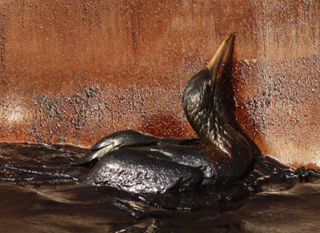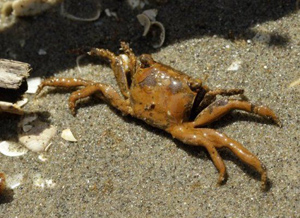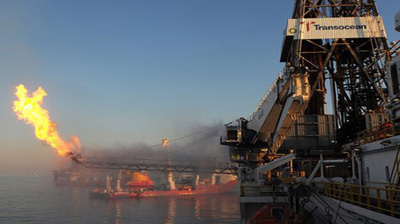Five years after Katrina, Louisiana hit by oil spill
On April 19th, the Louisiana coastline was filled with annual visitors enjoying the beauty of its beaches. Little did anyone know that in just 24 hours an explosion at an offshore drilling rig would transform the coastline into an ecological crisis of historical proportions.
As the flames bellowed into the air from BP’s oil rig, the Deepwater Horizon, the U.S. Coast Guard scrambled to rescue over 100 workers from the platform, 17 of them injured and taken to hospitals. 11 workers went missing, and a search-and-rescue mission was underway to try to locate them.
While we applaud the efforts to rescue BP’s workers, what is being done to rescue Louisiana from another catastrophe that in many ways is unrecoverable?
As the oil slick floating on the waters of the Gulf of Mexico reaches the coasts of Louisiana, its destructive impact on the local fishing and tourism industry for an already fragile state cannot go unreported. Many experts have focused on the ecological impact by accurately reporting that this poses the worst environmental tragedy of recent years. Louisiana’s precious inhabitant rich marshes are an absolute sanctuary for wildlife. Today, the oil covered waters present real challenges to the numerous species of birds, crustaceans and fish living there.

Before this disaster, this poor southern state was still recovering from Hurricane Katrina. Many of its residents had not completely dried off from the devastation of five years ago. Just as they were making real progress, another challenge was placed on them.
It’s one thing to battle a natural disaster. However, this disaster was driven my corporate malfeasance. BP has one of the worst track records among other oil companies. It has been reported that this spill stemmed from dead batteries, bad wiring and leaky blowout preventers. Yet in the end, it’s the people of Louisiana who will bear the brunt of the pain.
Consider the fishing industry. It is at the front line of this threat where 40% of seafood consumed in the United States comes out of these waters. That’s hundreds of shrimp boats returning to harbor empty, leaving thousands of laborers without paychecks.
Grand Isle, Louisiana was forced to close its 8-mile-long island beach from thousands of tourists who normally flock to the vacation spot to fish and swim. Prior to the disaster, its popular Cajun Holiday Motel was booked and thriving, but now every reservation has been canceled.
The Times Picayune reported that local residents can actually smell the stench of oil floating off their shores. Health authorities are now conducting extensive tests of air quality. If validated, the oil content in the air could cause headaches, nausea and vomiting. Imagine being a child or older adult living in these conditions.

Time is of the essence. The longer the incident lasts, and the further the oil spreads –the coastal damage that is presently confined to the state of Louisiana –will impact the rest of us.
However, Louisiana is a special case. It was often cherished for its rich multicultural, multilingual heritage, strongly influenced by a wonderful mixture of the French, Spanish and African cultures. For years its diversity was considered to be somewhat exceptional in the United States. Today it is experiencing hardships and challenges like never before. Instead of being admired for its richness, it’s now a target of sorrow and empathy.
Why is this precious state so unfortunate? Why can’t it catch a simple break?
We may never know the answer to these questions. However, I implore President Obama to do whatever possible to stop this oil spill and place Louisiana on the path to its second recovery.
Or risk Louisiana falling further behind the rest of the country, while losing the appeal that made it the gem of the south in the first place.
Also Check Out:
What exactly is the new Tea Party?
Health Care Reform Has Been Passed, But What Now?
Birdman taps into Oil

